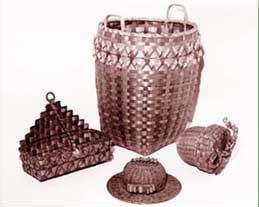Tradition

Work Baskets (Go to Historic Work Baskets Gallery)
Prior to European contact, Wabanaki basketmakers fashioned gathering and pack baskets and fish traps from brown ash. Admired for their strength and utility, many of these forms were readily adopted by Anglo-Americans for use in the home, fields and woods. In the late 18th and early 19th centuries, Indian peddlers commonly sold baskets door-to-door throughout Maine.
Forms dating to this period include covered storage baskets, which were woven free form with square bases and round tops. Forms dating to around the Civil War tended to be round with wide splint bands that were swabbed with indigo, Prussian blue, or chromium yellow. Sometimes, basketmakers combined blue and yellow pigments producing green. Many of these early storage containers were covered with a fabric draw-string bag, which helped to preserve them, while others were varnished to prevent the splints from breaking.
In addition to larger storage containers, open forms were also common, such as work baskets with indigo swabbed standards, where dye was applied on only one side of the splint, and round work baskets. Baskets were also woven using a hexagonal weave pattern, based on the same technique used to infill snowshoes.
Early 19th century baskets were simply woven and ornamented with splints dyed with natural pigments or vegetal dyes made from indigo, tree bark, roots or berries, producing shades of blue, red, yellow, green and brown. Toward the end of the nineteenth century, basketmakers began to use gauges to produce uniform width splints ranging in size from 1/32-inch to 3/4-inch. Elaborate curlwork decorated their works. Three forms of curls were commonly used: standard diamond curl-loops, porcupine curls-a sharp pointed curl and periwinkle curls-warts.
Fancy Baskets (Go to Historic Fancy Baskets Gallery)
Fancy baskets were made to meet the needs of the Victorian household and included containers for gloves, collars and handkerchiefs, sewing baskets and baskets to store sewing-related items, stationary and waste baskets and a wide variety of whimsical or novelty forms, such as teacups, pitchers and flower vases. By using wooden blocks or molds, basketmakers were able to produce a variety of forms in consistent shapes and sizes. Many fancy baskets featured sweetgrass, which was either woven in loose or braided into a three strand braid. and splints dyed with commerical aniline dyes in olive green drab, scarlet, pink and blue.
One of the most popular fancy basket forms was the sewing flat made with brown ash standards and infilled with sweetgrass. Flats ranged in size from six to 12 inches in diameter. Hours of sweetgrass braiding was necessary to produce enough material to weave the basket and their price reflected the labor these pieces involved. Many forms were also made for sewing notions, such as button baskets, needle cases, thimble and scissor holders and pincushions. Basketmakers also made knitting and tatting forms in the shape of strawberries and acorns.
Other Victorian household forms included calling card holders, trays— some with glass, that were used to serve tea sandwiches— stationary boxes and baskets made for use on ladies’ and gentlemens’ dressers, such as powder puff holders. Even a woman’s handbag could be made from brown ash and sweetgrass and glass jars and bottles were covered with splints to make vases. These forms all found a ready place in the decorative schemes of the Victorian home.
Extensive quantities of sweetgrass were used in Wabanaki fancy baskets from the late 19th century to the 1930s. In the 1920s, braided sweetgrass infilling gave way to the use of a new, weaving material–Hong Kong cord. As its name implies, this fibrous material came from Hong Kong and could be purchased by the skein from local stores. The use of purchased cord increased basket production by saving enormous amounts of labor that had been devoted to braiding sweetgrass.
In the 1930s, basketmakers began to use compound molds–molds which could be taken apart so that they could be removed once the basket had been woven. Common forms made during this period include tall cylindrical knitting baskets made on molds of six-inch diameter stove pipe, barrel waste baskets and shoppers.
